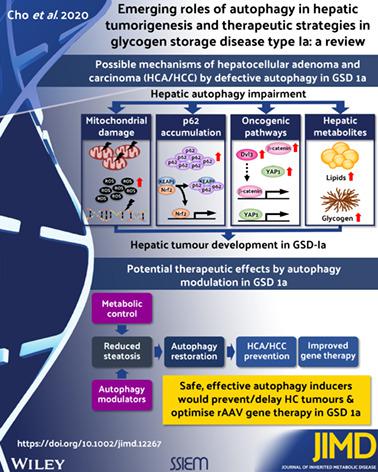当前位置:
X-MOL 学术
›
J. Inherit. Metab. Dis.
›
论文详情
Our official English website, www.x-mol.net, welcomes your feedback! (Note: you will need to create a separate account there.)
Emerging roles of autophagy in hepatic tumorigenesis and therapeutic strategies in glycogen storage disease type Ia: A review
Journal of Inherited Metabolic Disease ( IF 4.2 ) Pub Date : 2020-05-31 , DOI: 10.1002/jimd.12267 Jun-Ho Cho 1 , David A Weinstein 1, 2 , Young Mok Lee 1
Journal of Inherited Metabolic Disease ( IF 4.2 ) Pub Date : 2020-05-31 , DOI: 10.1002/jimd.12267 Jun-Ho Cho 1 , David A Weinstein 1, 2 , Young Mok Lee 1
Affiliation

|
Glycogen storage disease type Ia (GSD‐Ia) is an inherited metabolic disease caused by a deficiency in glucose‐6‐phosphatase‐α (G6Pase‐α or G6PC) which plays a critical role in blood glucose homeostasis by catalyzing the hydrolysis of glucose‐6‐phosphate (G6P) to glucose and phosphate in the terminal step of glycogenolysis and gluconeogenesis. Patients with GSD‐Ia manifest life‐threatening fasting hypoglycemia along with the excessive accumulation of hepatic glycogen and triglycerides which results in hepatomegaly and a risk of long‐term complications such as hepatocellular adenoma and carcinoma (HCA/HCC). The etiology of HCA/HCC development in GSD‐Ia, however, is unknown. Recent studies have shown that the livers in model animals of GSD‐Ia display impairment of autophagy, a cellular recycling process which is critical for energy metabolism and cellular homeostasis. However, molecular mechanisms of autophagy impairment and its involvement in pathogenesis in GSD‐Ia are still under investigation. Here, we summarize the latest advances for signaling pathways implicated in hepatic autophagy impairment and the roles of autophagy in hepatic tumorigenesis in GSD‐Ia. In addition, recent evidence has illustrated that autophagy plays an important role in hepatic metabolism and liver‐directed gene therapy mediated by recombinant adeno‐associated virus (rAAV). Therefore, we highlight the possible role of hepatic autophagy in metabolic control and rAAV‐mediated gene therapy for GSD‐Ia. In this review, we also provide potential therapeutic strategies for GSD‐Ia on the basis of molecular mechanisms underlying hepatic autophagy impairment in GSD‐Ia.
中文翻译:

自噬在肝肿瘤发生中的新作用和 Ia 型糖原贮积病的治疗策略:综述
糖原贮积病 Ia 型 (GSD-Ia) 是由葡萄糖-6-磷酸酶-α (G6Pase-α 或 G6PC) 缺乏引起的遗传性代谢疾病,其通过催化葡萄糖的水解在血糖稳态中起关键作用。 6-磷酸(G6P)在糖原分解和糖异生的最终步骤中转化为葡萄糖和磷酸盐。GSD-Ia 患者表现出危及生命的空腹低血糖以及肝糖原和甘油三酯的过度积累,导致肝肿大和长期并发症的风险,如肝细胞腺瘤和癌 (HCA/HCC)。然而,GSD-Ia 中 HCA/HCC 发展的病因尚不清楚。最近的研究表明,GSD-Ia 模型动物的肝脏显示自噬受损,细胞循环过程,对能量代谢和细胞稳态至关重要。然而,自噬损伤的分子机制及其在 GSD-Ia 发病机制中的参与仍在研究中。在这里,我们总结了与肝脏自噬损伤有关的信号通路的最新进展以及自噬在 GSD-Ia 中肝脏肿瘤发生中的作用。此外,最近的证据表明,自噬在重组腺相关病毒 (rAAV) 介导的肝脏代谢和肝脏定向基因治疗中起着重要作用。因此,我们强调了肝脏自噬在代谢控制和 rAAV 介导的 GSD-Ia 基因治疗中的可能作用。在这次审查中,
更新日期:2020-05-31
中文翻译:

自噬在肝肿瘤发生中的新作用和 Ia 型糖原贮积病的治疗策略:综述
糖原贮积病 Ia 型 (GSD-Ia) 是由葡萄糖-6-磷酸酶-α (G6Pase-α 或 G6PC) 缺乏引起的遗传性代谢疾病,其通过催化葡萄糖的水解在血糖稳态中起关键作用。 6-磷酸(G6P)在糖原分解和糖异生的最终步骤中转化为葡萄糖和磷酸盐。GSD-Ia 患者表现出危及生命的空腹低血糖以及肝糖原和甘油三酯的过度积累,导致肝肿大和长期并发症的风险,如肝细胞腺瘤和癌 (HCA/HCC)。然而,GSD-Ia 中 HCA/HCC 发展的病因尚不清楚。最近的研究表明,GSD-Ia 模型动物的肝脏显示自噬受损,细胞循环过程,对能量代谢和细胞稳态至关重要。然而,自噬损伤的分子机制及其在 GSD-Ia 发病机制中的参与仍在研究中。在这里,我们总结了与肝脏自噬损伤有关的信号通路的最新进展以及自噬在 GSD-Ia 中肝脏肿瘤发生中的作用。此外,最近的证据表明,自噬在重组腺相关病毒 (rAAV) 介导的肝脏代谢和肝脏定向基因治疗中起着重要作用。因此,我们强调了肝脏自噬在代谢控制和 rAAV 介导的 GSD-Ia 基因治疗中的可能作用。在这次审查中,



























 京公网安备 11010802027423号
京公网安备 11010802027423号